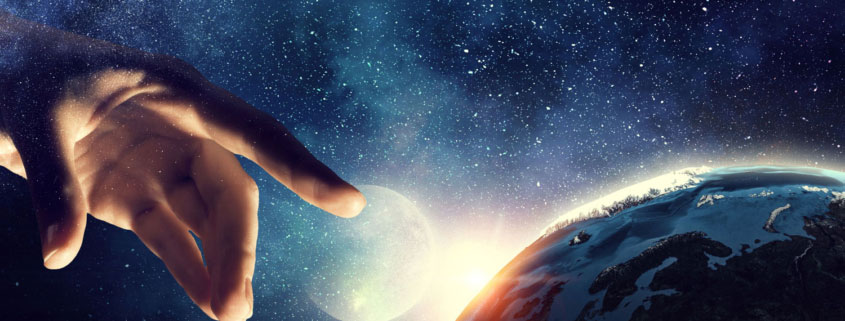God of Creation
What Is the Good News of Yeshua? (Part 2)
The opening words of Scripture, found in Genesis 1:1, speak precisely to the beginning of the message of the Good News. Before the very spreading out of the heavens and the foundation of the earth, there was God, and nothing but God. This fact cannot be glossed over or underestimated in its fundamental importance to sharing the Good News. It establishes the framework of God’s message, giving context and meaning to everything else that will follow. We cannot simply assume a communal awareness or agreement of how life on earth came to be, nor can we merely stipulate that life exists, and suffer all manner of theories and presumptions about its beginning. If we cannot openly attribute all life to God, then we have no basis for the Good News.
To avoid the God of creation is to undercut our entire message. Without God there would be no light—no land or seas, no plants or trees. There would be no sun or moon or stars—no day, no night, nor passage of time. There would be no waters teeming with life or creatures filling the sky—no animals of any kind moving and crawling along the ground. Without God, there would not be a single man, woman or child that exists today, that has ever existed, or that ever will exist—forever. Without God, there would be nothing but “nothingness and emptiness, and darkness” (Genesis 1:1, MJLT).
In a time when the formation of the universe by a Creator God is not only widely questioned but broadly ignored and extensively ridiculed, we cannot be afraid to bind the Good News to its beginnings. The creation of all things by the hand of a powerful Deity is no less likely to have happened than the salvation of all mankind through the death and resurrection of one man—the very Son of that powerful Deity, with whom He is also equal and One. If we are not fixed and firm on the history of creation as described in the Scriptures, then the Good News we proclaim becomes an unreasonable leap of faith. There is a God to whom Yeshua’s sacrifice is intended to draw us close, and if it is not the God who created all things, who, then, would it be?
No, the God of Creation is not to be overlooked or minimized. On the contrary, the same Scriptures that recount God’s wondrous acts of creation also testify to it repeatedly and with great affirmation.
For Moses there was no doubt that “Adonai had made the heavens and the earth, the sea, and all that is in them.” He taught that such a feat was literally accomplished in “six days,” before God “rested in the seventh day” (Exodus 20:11, MJLT). It is to this pattern that Moses attributes the six-day work week, followed by a day of rest. According to Moses, Adonai’s blessing and sanctification is embedded in this pattern because God established it from the time of creation.
Isaiah, too, raved over Adonai, confessing “He is God,” who is none other than the “Creator of heaven” and “Former of earth… its Maker.” He recognized that this Creator God “established” it all for a reason, stating unequivocally that “He created it not for nothingness,” but rather “He formed it for inhabiting” (Isaiah 45:18, MJLT). Our existence—indeed, the existence of all things—is not purposeless or by accident. God made creation so that we would be—He created us and the world we inhabit simply so that we may live.
But this life would not be formed at a distance, or merely initiated millions of years ago by a faraway, impersonal, supernatural being. Rather, He was and remains intimately and actively involved in His creation… beginning with every single precious and unborn life. The God of creation, who made the whole universe and every gargantuan, monumental thing in it, is also the one who intricately weaves the microscopic—and even the sub-microscopic—together within each one of us (see Psalm 139:13).
The Scriptures teach us that “from the creation of the world, the invisible things of [God]—being understood by way of the visible things that have been made—are plainly seen (both His eternal power and divine nature), so that [men] are without excuse” (Romans 1:20, MJLT). Indeed, this is “the truth” that we must not be “holding down… because that which is known of God is evident among [us], for God made it evident” (Romans 1:18-19, MJLT). Creation itself is the very first—and, arguably, the very best—evidence that God is; and, in its perpetual testimony, it allows for no persuasive reason not to believe. The reality that God’s “eternal power and divine nature” are so persistent in our conscious, daily experience, points precisely to the God of Creation as the proper foundation of any solid understanding of the Good News. He is majestic, He is powerful, He is here, and He is now. The same limitless, timeless God that created the universe millennia ago is the same God that still causes the sun to rise, the grass to grow, and the thriving and teeming of life all over the earth today. “Having known God” by His own irrefutable self-evidence, we must “glorify Him as God, [and give] Him thanks” (Romans 1:21, MJLT).
The God of Creation cannot be denied, and the life He gives, He gives so that we may live. To what do we owe this generous, tremendous gift? With what shall we pay Him the honor due His Name?







Leave a Reply
Want to join the discussion?Feel free to contribute!